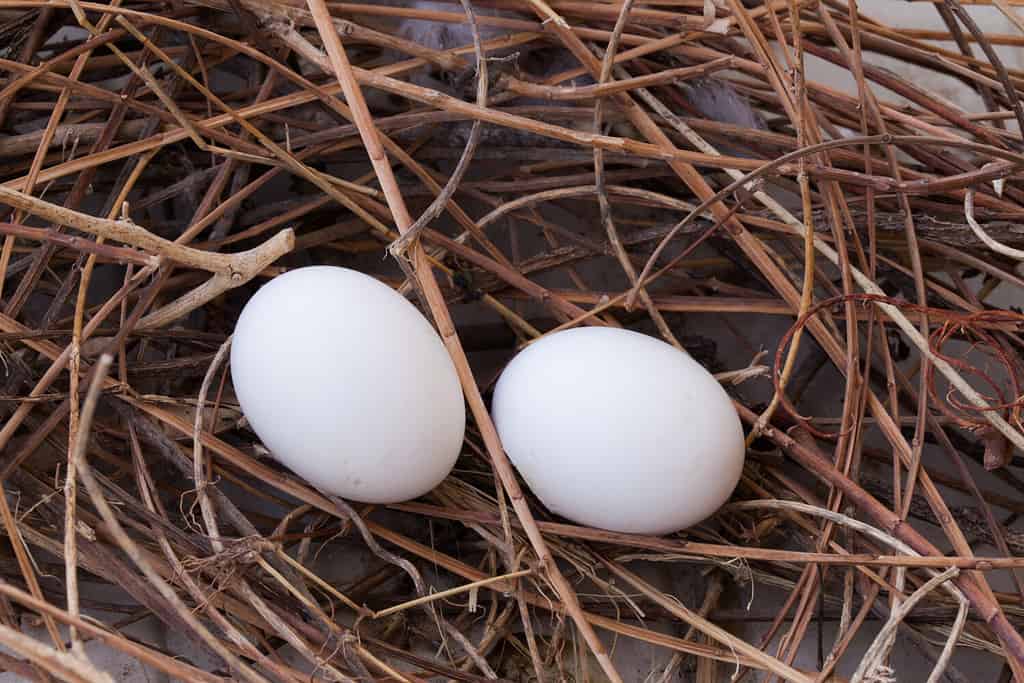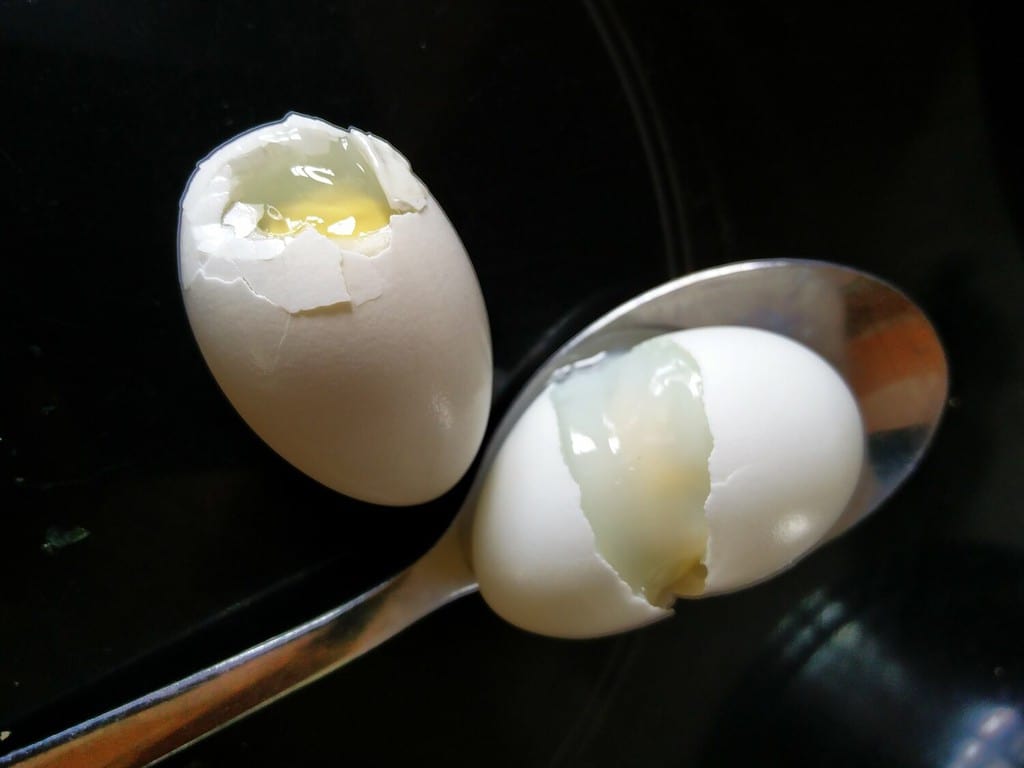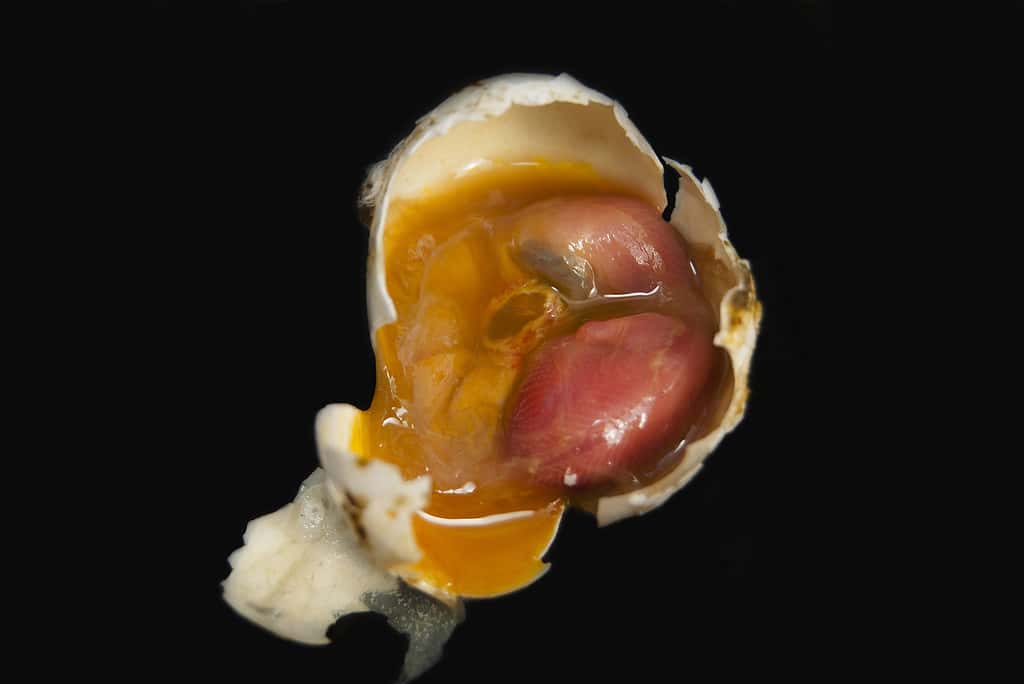Historically, pigeons were commonly raised as a food source. The term squab refers to a young pigeon ready for human consumption, but can you eat pigeon eggs? We’ll go over some details now.
Can You Eat Pigeon Eggs?

Pigeon eggs are an edible food commodity prized in many countries.
©Irit/Shutterstock.com
Yes, you can eat pigeon eggs. Believe it or not, they were a prized food commodity for thousands of years. They’re still a delicacy in many countries.
Like any egg, they need to be cooked thoroughly as there is a risk of salmonella contamination. Urban pigeons are often unhealthy and carry diseases, so their eggs should not be consumed. Their eggs will also taste like trash since that’s most likely what they’re eating.
What Do Pigeon Eggs Look Like?
Pigeon eggs have a paper-thin shell that shatters easily. As a result, they’re super prone to accidental breakage. When they’re shipped, they’re set in a bedding made of sawdust to ensure a safe arrival.
They come in a variety of colors. They’re usually white, but they can also be brown or blue. Some are speckled.
They’re much smaller than chicken eggs though they’re bigger than quail eggs. They’re usually about an inch in length while a chicken egg averages over 2 inches. Since pigeon eggs are smaller than a chicken’s egg, a few pigeon eggs are needed if substituting for chicken eggs in a recipe.
What Do Pigeon Eggs Taste Like?

Pigeon eggs taste like chicken eggs but with a stronger flavor.
©orzeczenie/Shutterstock.com
Pigeon eggs taste like chicken eggs, though they are a little different. They’re more gelatinous than a chicken egg, and have a rubbery bounce when you bite into them.
The egg whites are denser than chicken eggs when cooked, but they’re also clearer. If an egg is served whole, the yolk is visible through the cooked whites. The yolk is bigger proportionally in a pigeon egg than in a chicken egg, and it’s much richer in taste.
A stronger smell also accompanies this richer taste. While the smell of pigeon eggs isn’t necessarily off-putting, it’s a much eggier smell than chicken eggs.
They take a long time to hardboil since you should cook them one at a time as they may break if they hit each other. Also, if the rolling water causes the egg to bump against the side of the pan, it can easily break. If you do decide to hardboil your pigeon eggs, let each one cook for 7 to 10 minutes.
Pigeon eggs are better suited for pan frying. They’re also too small to scramble effectively as too many eggs are required. Pigeon eggs do best if they’re steamed, peeled, deep-fried, and then eaten whole.
Where Can You Buy Pigeon Eggs?
Pigeon eggs for consumption are hard to come by because the birds are finicky breeders. They also don’t produce eggs very quickly. They are monogamous birds and usually won’t breed with another partner if their mate dies, and females will not lay eggs without a partner.
A breeding pair of pigeons produces two eggs at a time. During a successful year, they may breed up to six times. This means that a pair of pigeons will only produce about 12 eggs per year.
If an egg is removed, the birds become flustered and may stop producing eggs for quite a while. Dummy eggs are used by producers to keep pigeons productive when eggs are harvested.
Pigeon eggs go bad quickly and last no more than a week in a refrigerator. They should be eaten the same day they’re laid to guarantee freshness. They will last a second day without refrigeration, but most will spoil if they’re left unattended much longer.
That said, it is possible to buy pigeon eggs from farmers though they come with a hefty price tag. However, it’s hard for the average consumer in the United States to find them as most available eggs are sold to high-end restaurants. In other countries, they are sometimes sold in markets as they become available to individual vendors.
In a restaurant in the United States, you can expect to pay almost 30 dollars per egg that you consume. They almost always will not be a standard menu item, and you’ll have to reserve the dish when you make a table reservation.
Are Pigeon Eggs Good for You?
Pigeon eggs contain less fat than chicken eggs, and they’re also high in vitamins B1 and B12. They also contain important minerals like zinc and iron.
They’re a high source of protein as about 10 percent of the total egg is nothing but protein. That’s almost half an ounce of protein per egg.
Pigeon eggs are a good source of sulfur-containing amino acids. They contain more of these specific amino acids than normal chicken eggs.
Chinese medicine dictates that pigeon eggs are good for the kidneys. That’s because they affect the yin jing which assures good circulation and the replenishment of bodily fluids like blood.
During the Al-Andalus period in Spain, pigeon eggs were considered an aphrodisiac. They were considered especially effective if cooked with onions in turnip juice. Later, the Spanish of the 1300s considered pigeon eggs a cure for digestive issues caused by overeating.
Can You Eat Fertilized Pigeon Eggs?

You can eat a fertilized pigeon egg at all stages of development.
©Alla Orlova/iStock via Getty Images
Yes, you can eat fertilized pigeon eggs. As a rule of thumb, most fertilized eggs can be eaten. However, the contents of these eggs make many Western diners uncomfortable.
A pigeon’s egg hatches about 18 days after fertilization. At each stage of its development, it will look a little bit different when eaten.
If an egg has been fertilized the same day that you eat it, it won’t look much different than an unfertilized egg. If it’s had a few days to develop after fertilization, the yolk develops red veins. It is safe to eat these veins.
By the time the eggs are a week old, a discernible chick will be inside of the egg. The older the egg gets, the bigger the chick will be. Any remaining egg sac can also be eaten.
While it may seem upsetting, every part of the chick is edible. The bones and beak are relatively soft and chewable. If the egg was about to hatch, the beak and feet may need to be discarded.
The photo featured at the top of this post is © ENRIQUE ALAEZ PEREZ/Shutterstock.com
Thank you for reading! Have some feedback for us? Contact the AZ Animals editorial team.







